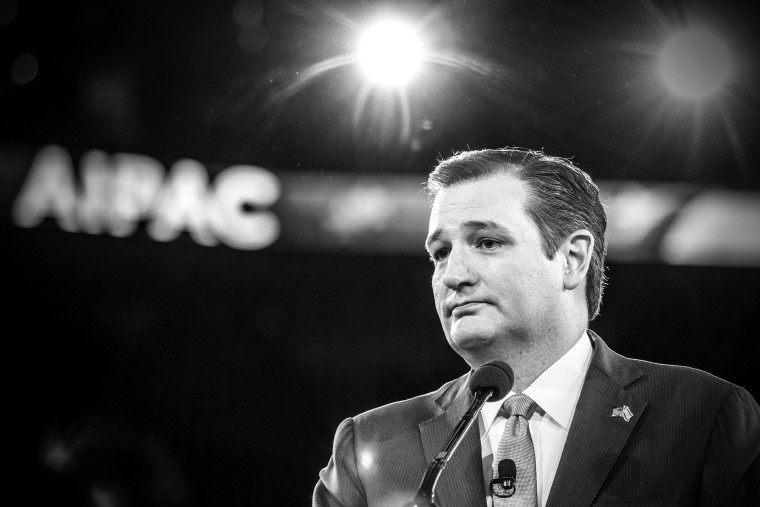In a back room before a campaign event in Hershey, Pennsylvania earlier this week, Ted Cruz sat down to do the most pressing work remaining in his presidential bid: convincing a group of delegate candidates to vote for him in the event of a contested Republican convention.
With almost no path for the Texas senator to win a majority of his party’s delegates – 1237 – before the convention after front-runner Donald Trump swept all but four of New York’s 95 delegates this week, Cruz’s hunt is his only hope for survival. His focus now is Pennsylvania, where voters will choose 54 unbound delegates who can vote as they like on the first ballot at the convention.
Trump’s campaign is also organizing heavily there after losing a streak of delegate elections to Cruz in Colorado and North Dakota. That means both campaigns are locked in a cage match that could determine the convention's outcome in July.
Cruz and his staff routinely refuse to talk about their strategy, but his aggressive courting of Pennsylvania delegates reveals a two-part game plan: personal appeals from the senator himself and top surrogates like Carly Fiorina to delegate candidates; once they’ve identified their supporters, making sure they are elected delegates.
So in a room off an antique automobile museum in Hershey, Pennsylvania, Cruz chatted, took photos, and answered the questions of approximately 20 delegate candidates, who are among the 165 people running in local elections for those 54 unbound delegate positions -- three in each of the state's 18 congressional districts. With his presidential bid on the line, Cruz is determined to meet all of them.
“We find there’s no better person to sell the senator than the senator – when he sits down and spends an hour with a group of people, they usually leave the room pretty committed to him,” said Lowman Henry, the volunteer state chairman of the Pennsylvania Cruz campaign and a candidate for delegate himself.
MSNBC interviewed 12 of the 28 delegates the Cruz campaign says have committed to supporting him: Ten have already met the candidate – some multiple times – or have plans to meet him in the next week. An eleventh missed a scheduled meeting earlier this month.
RELATED: Crus, Kasich pitch GOP leaders as contested convention looms
“By the time we wrap up, on next Monday evening, we will have at least reached out to everyone,” Henry said, noting that he's already introduced 50-60 delegate candidates to Cruz, and some to Fiorina, too. Schedules permitting “we might meet everyone, except for a few hardcore Trump supporters.”
In interviews, delegate candidates said the 30-45 minute-long meetings with Cruz and Fiorina gave them a chance to ask questions about policy and campaign strategy, in an intimate setting.
Thomas Pyne, a Cruz supporter running in the state’s 11th district, was invited by the campaign to meet Fiorina last week at the opening of the state’s campaign headquarters. They met Cruz after sitting near him onstage at the Hershey event.
Both encounters "reaffirmed my conclusion" to support Cruz, Pyne said Thursday.
Strategists say meetings like this help delegate candidates feel invested in the campaign, and they’re necessary to ensure that they can be counted on to stay loyal in the event of a second, third, or even fifteenth ballot at the convention.
Political know-how and financial aid also help: Half of the delegate candidates interviewed by MSNBC have been offered or given help with their delegate campaigns.
In the 2nd congressional district, Aldridk Gessa said the Cruz team shared a database of likely supporters with her. In the 20th congressional district, Jeff Steigerwalt said the campaign had offered to pay for robocalls and advertising on social media supporting his candidacy for delegate. Lois Kaneshiki, running in the 9th district, said the Cruz campaign had talked about making palm cards for her candidacy. In the 12th district, Bruce Keeler said the campaign was helping him navigate his efforts to get elected with their know-how and experience.
Henry said staffers from the Cruz national headquarters in Houston, along with another dozen on the ground in Pennsylvania began recruiting delegates as early as last Fall.
“We made a very early determination that delegates were important and that has been our singular focus from the beginning,” Henry said.
RELATED: Is the Stop Trump movement in crisis?
But while the Cruz campaign may have out-organized Trump earlier in states like Colorado and North Dakota, which elect delegates at local conventions, the Trump campaign is working hard to make up for lost time, courting delegates aggressively in Pennsylvania. Even among the dozen delegate candidates interviewed by MSNBC -- who have all publicly declared their support for Cruz -- a third had been contacted by Trump supporters working to see if they'd change their minds.
Still, despite Trump's lead and the fact that he could still reach 1,237 delegates in the remaining primaries, eliminating the need for a contested convention, Cruz insists a floor fight is inevitable.
"We’re going to arrive with me having a ton of delegates and Trump having a ton of delegates -- at that point it is going to be a battle to see who can earn a majority of support of delegates," Cruz said Wednesday. "I believe we are going to have an advantage."
It's an advantage that will be tested in Pennsylvania, and even his organizers aren't sure they'll immediately come out victorious.
"I think it’s going to take awhile for the dust to settle after the primary," Henry said, because so many delegate candidates have said they'll support whichever candidate wins their district, but aren't legally required to be so and might be later swayed. "I don’t know if we’ll get to a majority.... Between us, Trump and the uncommitted you’re going to have a pretty split finish."
